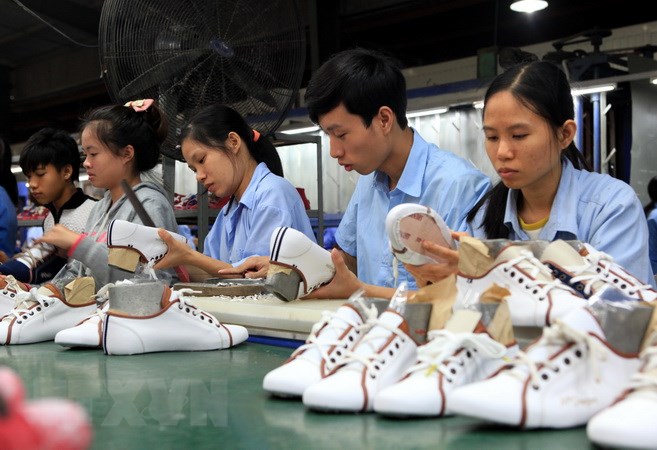The COVID-19 pandemic has been hitting Vietnam’s leather and footwear businesses since the first quarter of the year.
According to General Secretary Phan Thi Thanh Xuan of the Vietnam Leather and Footwear Association (Lefaso), there has been a reduction in exports and orders, together with an interruption in material supply.
Difficulties keep piling up
Reporter: What was the impact of the pandemic on the leather and footwear sector in the first quarter of the year?
Phan Thi Thanh Xuan: In January alone, the sector’s exports dropped 30 percent compared to the same period in 2019. The number went down even harder in February, with exports reaching just nearly 1 billion USD. The figure for February last year was 3.1 billion USD.
According to statistics from the Ministry of Industry and Trade, the value of overseas shipments of footwear products, as well as handbags, suitcases, hats, and umbrellas, dropped 1.9 percent and 6.5 percent on year, respectively.
If import markets remain closed to curb the spread of the disease, consumer demand will keep falling, significantly affecting production.
In the remaining quarters of the year, if import markets remain closed to curb the spread of the disease until the last quarter of the year, stores will continue closing their doors, and consumer demand will keep falling, significantly affecting production.
I think there will be three big problems.
First, the material supply sources, despite catering to production demand, are not diverse. As such, new orders will not cover a wide range of products.
Second, although enterprises are capable of producing ordered goods, they could not export them, as their clients are seeing a reduction in their sales. It means that they will face a high risk of customers cancelling their existing orders indefinitely.
Finally, no new orders from customers due to the pandemic will affect the trade of goods.

Reporter: Can you share more about these difficulties and the response scenarios prepared by firms in the sector?
Phan Thi Thanh Xuan: Our firms have been working to promptly deliver goods to their customers in the first and second quarters. However, as we can see, the markets are being closed, hence raising concern over the delivery in the second quarter. As the pandemic remains complicated, there is a high chance of customers cancelling their orders.
As for the third and fourth quarters, if the situation gets better, our enterprises will also have the opportunity to obtain new orders. If the situation gets worse, a drop in orders of at least 30 percent or even an end to orders will be likely.
As a result, workers’ job security is being threatened. Since April, many of them have been taking turns to temporarily stop working.
Currently, the most pressing issue of the sector revolves around the number of goods orders, as its key markets are plagued by COVID-19.
Reporter: Do you believe that imported materials are a factor directly affecting the business outside of the market?
Phan Thi Thanh Xuan: Plants in China have resumed operation, thus the materials are no longer a big issue.
Currently, the most pressing issue for the sector revolves around the number of goods orders, as its key markets are plagued by COVID-19.

Policies must be flexible
Reporter: Which policies do the Lefaso think are suitable for the sector at the moment?
Phan Thi Thanh Xuan: Leather-footwear and garment-textile are fashionable industries, meaning they are diverse and change quickly. Therefore, the two require open and flexible policies.
If we have good policies, we will attract technologies serving the production and development of materials.
If we have good policies, we will attract technologies serving the production and development of materials. High standards are only suitable for foreign-funded or big enterprises, while small and medium-sized are those we are targeting for development.

Reporter: Do you believe that, in the long run, we have to build supply chains and own our trademarks for sustainable growth?
Phan Thi Thanh Xuan: Currently, many companies are offering outsourcing services for big international brands. By doing so, they are joining the global supply chain.
Self-development of trademarks is good but the capacity of our enterprises remains limited. They are yet to reach the global market. As such, companies can become outsourcing service providers or develop their own brands depending on their business strategies.
Reporter: What are the recommendations of Lefaso for enterprises to stand strong amid current market fluctuations?
Phan Thi Thanh Xuan: Support from the authorities is necessary.
Self-development of trademarks is good but the capacity of our enterprises remains limited. They are yet to reach the global market.
For example, they can issue policies that allow enterprises to delay their payment for insurance and bank loans or have the costs reduced until their number of orders become more stable.
Thank you!

